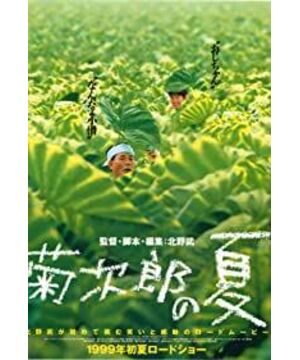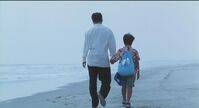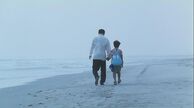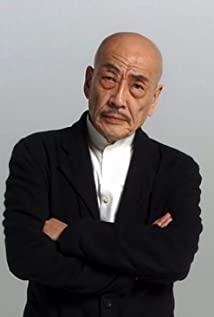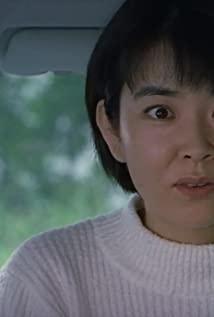I know Director Takeshi Kitano because I like Joe Hisaishi's music. And I know the movie "Kiujiro's Summer" because "Summer" is my favorite song among the many works of Joe Hisaishi.
In fact, I had a very rough viewing process for this movie.
The first time I saw it was when I was practicing the song "Summer" in elementary school.
I didn't understand it at the time, I just thought the movie was more boring than Summer itself.
In addition, the episode of Zheng Nan being harassed by a perverted uncle in the park really cast a shadow on my young mind, and I gave up the drama early. And for a long time in the future, "Kiujiro's Summer" was marked by me as a dark perverted film.
It was not until I finally grew up and reviewed this work again that I solved this misunderstanding and slowly understood the kind of gentleness of a tough guy that is exclusive to Takeshi Kitano.
"Sir, let's play together, for that child."
- The destination itself is not the meaning of travel
"Summer", whether it is a symphony or a solo piano version, is composed of two sets of melodies superimposed.
A group is floating above, relatively slow and long melody. It seems that the sultry summer is so long, and it is like a mother who has never met in the distance, out of reach. It allows us to set our eyes on the distant skyline and see the endless road one after another.
At the same time, another set of melody composed of short single notes is laid out below , jumping cheerfully and lively, just like Kijiro and Masao are constantly advancing, and with that small figure and fast pace, in the scorching sun This special journey is engraved with bits and pieces.
At the beginning of the film, before the official story begins, Takeshi Kitano and Joe Hisaishi use this kind of music to show us a road and the people who are looking for it on that road.
"Summer of Kikujiro" can be said to be a typical road movie. The protagonists set off on the road for their own reasons, heading for the same destination.
During the summer vacation, all the children went on vacation, the football training camp was also suspended, the father died in a car accident, the mother was in another city, and the grandmother had to go to work again, leaving Zheng Nan alone, guarding the empty house and Cold meals, nothing to do.
In order to ease the child's loneliness, the mother-in-law's friend, Kikujiro's wife, suggested that Kijiro take Masao to the beach. So Zheng Nan set off on the road, with a longing for his mother in his arms.
That's what motivates him and what drives him on the road.
In contrast, the purpose of Kikujiro's trip is more complicated, and I would like to elaborate on it later.
And this destination is the home of Zheng Nan's mother. Although such a destination is the immediate reason and greatest desire for the protagonists to travel, it is not the most important meaning of the journey. More importantly, how can these people who were originally disabled and regretful have to complete themselves and grow on this road.
In many road films, the protagonist's original goals are not achieved until the end of the film.
For example, in "Little Miss Sunshine", the little girl did not become a beauty queen as she wished. But her family has re-understood and redefined their family relationships during this journey, realizing that family love may be greater than many things they relentlessly pursue.
Back in "Kijiro's Summer", Masao also failed to realize his wish. Even though she has seen her mother from a distance, she has not been able to obtain the desired joy because she has reorganized her family.
But both he and Kikujiro have received far more surprises in this long and even full of unexpected trips.
"—Uncle, what's your name? —Kiujiro. Fuck, get out of here!"
- This summer is Kijiro's summer
This summer can actually be divided into two parts.
The first part is that Kijiro takes Masao to find his mother.
At the beginning of the film, Zhengnan just came home from school when he was on summer vacation. On the way, he met Kijiro and his wife.
The couple looked at the back of the little boy as he left alone and discussed his mother.
Kikujiro said angrily: "His mother must have run away with other men." His wife retorted: "Do you think everyone is like your mother?"
Kikujiro didn't say more about his family affairs, just made a joke in an understatement, and then led the topic to his wife's mother, teasing that she also had many marriages.
A seemingly ordinary and casual conversation revealed why the experience of accompanying a little boy in search of his mother this summer was so special to Kikujiro.
I have always wondered why Kikujiro, such a ruffian, full of foul-mouthed, and even a rogue man, is willing to "waste" an entire summer, sacrificing time for gambling and drinking, walking with a child under the scorching sun?
Indeed, under his rough exterior, there is delicacy wrapped in gentleness and kindness. Indeed, behind his arrogance hides a childlike innocence.
But this motivation is not enough for me.
It wasn't until I saw Zheng Nan's mother walk out of the house, watching her new husband and their daughter leave, that I remembered the joke at the beginning again.
It turns out that Kikujiro was also Masao.
Just as in the abandoned bus station in the countryside, the middle-aged uncle looked at the boy sleeping on his lap and said softly, "So he is the same as me."
For this middle-aged man, this trip is a reappearance of his childhood experience and an attempt to make up for all his childhood regrets.
I think this is probably the fundamental reason why he hit the road, and also his original wish. He hopes that by accompanying the young boy to find his mother, he can relieve the pain that his mother chose to leave to find another way of life when he was young, but he was powerless.
He longed to see all the miracles he had never experienced in this boy.
But such a beautiful hope finally came to nothing. The two had no choice but to take the road back again.
The story should have ended here.
But it doesn't.
The version I watched happened to be split into two episodes. Seeing this, I glanced at the progress bar, only to find that the second episode has just begun.
In other words, in order not to let Masao go home with disappointment, the story of Kikujiro taking him and the new friends he made on the road to camping is not a procrastination at the end, but the second part of this summer, which is equally meaningful.
A group of people pitched tents and talked about myths under the stars, and took fishing rods to fish their childhood by the pond without fish.
They let go of the rationality and decency that all adults should have, and desperately play funny and ugly in the water, even don't even need clothes, and only care about running wildly in the vitality of summer.
Rather than saying that this group of adults did their best to play for the smile of the boy, it was more about letting go of the unhappiness in life and laughing freely for the child in their distant memory.
In this part, Kikujiro begins his second attempt to make up for his childhood regrets. In the dining room of the nursing home, he just glanced at his elderly mother from a distance, and left without saying a word to her.
The trip with Zhengnan finally gave him the opportunity to reconcile with the past in this special way when he was also at the age when his mother left.
From this moment on, he no longer pinned all his emotions on the image of the mother who chose to fly away, but focused on the boy and himself in front of him at the moment.
He hopes to rely on active creation to obtain happiness, and to teach Zhengnan: when there are bound to be some regrets in life, keep the childlike innocence, always look at the world from a romantic perspective, then life will always be lovely.
It's like the movie starts with a man running with a blue angel backpack and ends with a similar scene.
Going around in circles, travel is just going back to the original point in the end, and no matter how far life goes, its happiness still comes from the most sincere heart.
Kikujiro created a good memory for Masao's childhood, and also used it to explain all the beauty that he lacked in his childhood.
"It would be great if every bastard had an angel inside of him."
- When summer is "no entry"
Kitano's unique perspective coupled with Hisaishi's moving music, the sparks brought by the collision are unimaginable.
I can't help but cry whenever "Summer", "The Rain", "Mother" are played.
But outside of this, what touched me the most was a scene in the film.
It was Kijiro and Masao, playing on the open lawn beside the road with the young couple he met on the road.
That lawn seems to be an exclusive kingdom of youth . Whether adults learn to play clown toss a ball or play coin-operated electric dolls, it seems that they all return to the most free childhood with the vibrant greenery around them. world.
And just as we watched them immersed in carefree, the camera slowly pulled out silently, and the picture changed from a close-up to a long-range.
We also gradually saw the four large red characters "No Entry" originally hidden from the screen in the foreground.
While telling us how free, happy and carefree they are at the moment, the striking red seems to be alerting us:
Maybe at a certain stage in life, we can no longer return to that innocent time freely, and real life forces us to grow up step by step and stop being a child. It takes courage to regain those joys.
If it is said that summer represents all the vigor and vitality, all these beautiful jokes that belong to children, and the purest happiness, then this shot also seems to say that this summer is the reason for Kijiro's summer.
Because, for Masao, this summer vacation is nothing but the growth of a young boy, but for Kikujiro, it is a middle-aged man's retrospect of the brilliant past.
You know, in the long road of life, we have countless opportunities to grow, but there are very few opportunities for us to let go of everything and reverse the rings of the four seasons, to return to the innocence and to freeze in the summer.
View more about Kikujiro reviews


